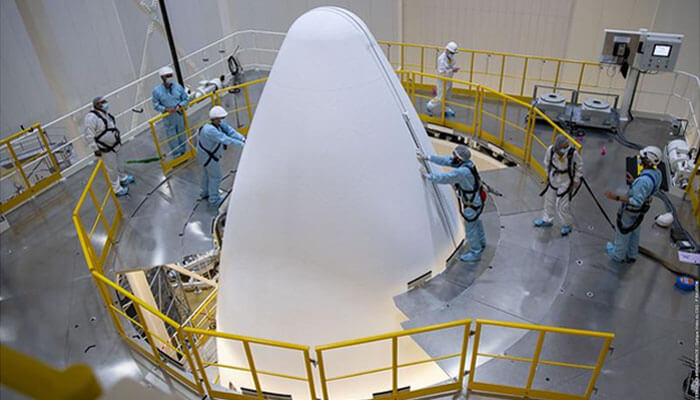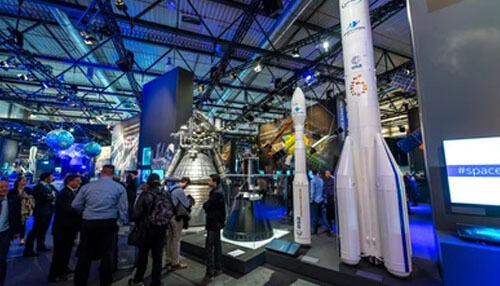Ukraine can become a major contributor to the European space market by offering a technical base, human talent, and financial support. These insights come from a recent report published by Max Polyakov’s Noosphere Ventures investment fund. Still, Ukraine acts as an unofficial ESA contributor. Noosphere’s industry report claims that closer cooperation can result in increased benefits for both the Ukrainian space industry and the ESA.
Ukraine already contributes its share to many European Space Agency projects. Ukraine-ESA cooperation began back in 1999 and has already resulted in many cutting-edge initiatives.
Why Should the European Space Industry Partner with Ukraine?
Ever since the European community sanctioned Russia for its military invasion of Ukraine, many joint ESA projects have had to be postponed indefinitely. This created a major gap that would not be so easily filled, as ESA’s Director General, Mr. Aschbacher, shared during the IAC 2022 event in Paris. Maxym Polyakov’s Noosphere came to different conclusions, claiming that this need could easily be met by building stronger relations with the Ukrainian space segment.
For example, ExoMars is one of the most anticipated ESA projects Russia withdrew from. And Ukraine’s Yuzhnoye SDO has enough technology and human talent to provide Mars landing equipment Russia will no longer be building.
Besides, the Mars rover would not become the first space technology designed and developed in cooperation with Ukrainian engineers. The country has clear ambitions to join the European space segment and has enough scientific potential to back them up. For instance, Ukraine joined the Lunar Moon Village Association in 2018 and, since then, has already introduced the concept of its own Moon Village module. As a subcontractor of Thales Alenia Space, Ukraine has been working on the supply of thermal-hydraulic accumulators for SES-17 since 2021. Both collaboration examples are highly fruitful, even though Ukraine still does not have ESA member status.
Besides its rapidly developing space technologies and already existing successful projects, Ukraine has some of the best human resources in all of Eastern Europe. Even back in the 20th century, this country always boasted a strong scientific community and a solid educational base, particularly in STEM careers. Today, Ukraine’s space sector employs 16,000+ qualified engineers, which is equivalent to NASA’s staff.
In one of his interviews with Bloomberg, Max Polyakov, an international entrepreneur born in Ukraine, mentioned outstanding efforts from his Ukrainian co-workers. Maxym Polyakov’s US-based ex-company, Firefly Aerospace, is working on the Alpha rocket and was backed up by a Ukrainian R&D center in Dnipro. Besides, Dr. Max Polyakov is not the only space giant with R&D centers in Ukraine. There are over a hundred of them as of now, including one from Boeing.
From the Ukrainian point of view, the country’s space sector is booming. Curiously, the Ukrainian government allowed private companies to produce their launchers only three years ago. Today, this segment is already widely represented, as 60 aerospace startups are ready to showcase their creations to the world.
Such rapid development should not come as a surprise because Ukrainian space engineers have already collaborated with international rocket giants, including the American Antares and the European Vega. Recently, German aerospace startup Rocket Factory Augsburg employed Ukrainian experts to assist in the rocket engine development for their RFA-One launcher. Besides, Ukraine was the ninth country to sign the Artemis Accords in 2020 and is now actively contributing to NASA’s latest lunar exploration mission. For example, Firefly Aerospace should soon present its Blue Ghost lunar lander, whereas its engines will be built by the Ukrainian company Flight Control.
Another important ESA statement during IAC 2022 was the agency’s plan to raise more funding, and Ukraine can contribute to this part, too. According to the Noosphere Ventures report, the budget plan for the development of the Ukrainian space industry reached €151 million shortly before the Russian invasion. Some might think that the war hinders these plans. In practice, space technologies are essential for defense and reconnaissance, so this figure is more likely to increase. Potentially, allocating such impressive sums to space industry development could make Ukraine one of the top 10 space technology investors by European standards.
Last but not least, Ukraine has already been granted EU candidate status this summer. This means that the European community is already prepared to welcome Ukraine as a member.
So, why stop at this point? ESA membership seems the next logical step.
Noosphere Venture Partners is an international investment fund, mostly known for its support of the US company Firefly Aerospace and Italian D-Orbit
Max Polyakov is a Ukrainian-born entrepreneur and investor who has been building successful businesses since the 1990s. Some of his most famous projects (besides EOSDA and Firefly) include Maxymiser and Hit Dynamics. Lately, Max Polyakov has become largely invested in philanthropy.



